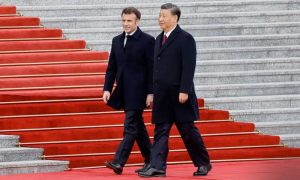Tri-nation joint naval drill was conducted in Gulf of Oman waters from March 11 to 15. Participation of Chinese, Russian and Iranian naval forces in the exercise titled “Maritime Security Belt 2024” has drawn the attention of keen strategic observers.
Initiative of joint naval drills took place for the first time six year back in 2018. This year, it was the sixth consecutive show which appeared more than usually significant due to deteriorating maritime security situation in nearby Red Sea region. Gulf of Oman is situated near the narrow mouth of Arabian Gulf the strait of Hormuz through which one fifth of international oil shipping activity takes place. Strategically important Gulf of Oman is in limelight due to series of attacks on ships since 2019, for which US had been blaming the Iran. However, collapse of Iran’s nuclear deal with US can be cited as the trigger point for renewed tensions in the region until October surprise raids of Hamas and subsequent unproportioned Israeli strikes on Gazans jolted the ME region. Impact of security threats to shipping activities and regional economies amid Houthi strikes was briefly pointed out in an article titled ‘Looming Security Crisis in Red Sea’ published on this platform on 23 February 2024.
Significantly this joint exercise was conducted at a time once the confrontation in the Red Sea is growing gardually after Iran-aligned Houthis had launched drone and missile attacks on international and commercial shipping to express solidarity with the Palestinians.
US and its allies have already started naval operations and strikes in Red Sea on the plea of maritime security. China, which stations its warships at a naval base in Djibouti near the Red Sea, has not officially slammed the Houthi attacks but according to media reports, Beijing has urged Tehran to rein in attacks on ships in the Red Sea. China also abstained from a United Nations Security Council resolution on the conflict in January. Recent naval power show in Gulf of Oman in the form of joint drills seems an obvious counter move in blue waters from China, Russia and Iran. These countries are undeniably engaged in strategic contestation with the US and its allies on global chessboard. According to Chinese defence ministry, the navies of China, Iran and Russia took part in “Maritime Security Belt – 2024” joint exercise in the Gulf of Oman against the backdrop of rising armed conflict in the Red Sea with an aim to jointly maintain regional maritime security.
China dispatched the 45th Special Escort Group, which consisted of the guided-missile destroyer Urumqi, the guided-missile frigate Linyi, and the general supply ship Dongpinghu. The seriousness of the security crisis can be gauged from the fact that the 45th Special Escort Force of the Chinese Navy has been stationed in the Gulf of Aden since October.
It completed escort tasks for 72 Chinese and foreign vessels in 43 batches and provided security for 14 transiting merchant ships before transferring its role to the 46th naval escort task force in first week of March.
Russian Pacific fleet, led by the Varyag guided missile cruiser and the Marshal Shaposhnikov frigate took part in the joint drills. According to TASS the Russian Defence Ministry said “Russian vessels will participate in the joint naval exercise Maritime Security Belt – 2024. It will also involve ships, boats and naval aviation of Iran and China. Representatives of the navies of Pakistan, Kazakhstan, Azerbaijan, Oman, India and South Africa will act as observers.”
Muscle-flexing of global players and their allies in international waters to project the combat prowess on the pretext of maritime security is actually a loud promulgation of strategic re-alignments. Intent behind the alliances like ‘QUAD’ and ‘AUKUS’ need no more deliberation due to obvious lines drawn on global chessboard between major powers. What is shaping up between US, China, Russia and EU countries in international waters is no more a secret. Security threats in Red Sea due to Houthi strikes on various ships have invited the extra territorial forces in the regions. Under turbulent environment, invitation to India, Pakistan, South Africa, Kazakhstan, Azerbaijan and Oman as observers in ‘Maritime Security Belt — 2024’ actually mitigated the optics of hostility and confrontation. Strategic straits like Hormuz, Suez, Red Sea and Mediterranean should be kept conflict free for the common good of all stakeholders. KSA along with regional stakeholders can play a key role through constructive diplomatic engagements to seek the durable solution of regional crises.
(Writer is freelance and can be reached at [email protected])























